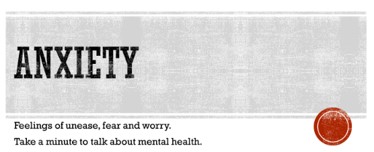Mental Health - Anxiety
Marie Claire magazine reported an increase of people suffering from anxiety and panic attacks.
“In the past five years, charity Anxiety UK has seen a 10 per cent increase in calls to its helpline and email support network, with one in ten people suffering from panic attacks and, of these, two thirds are women. Meanwhile, NHS figures show outpatient appointments for anxiety disorders, of which panic attacks are a common form, have increased five-fold since 2007, and hospital admissions increased by a third. Prescriptions for tranquillizers such as Xanax and Valium rose by 13 per cent in the past four years, and for antidepressants – often used to treat panic attacks – by 38 per cent.”
(Marie Claire, October 2016)
But what do we mean by anxiety?
 The charity, Mind, states that:
The charity, Mind, states that:
“Anxiety is a word we use to describe feelings of unease, worry and fear. It incorporates both the emotions and the physical sensations we might experience when we are worried or nervous about something. Although we usually find it unpleasant, anxiety is related to the ‘fight or flight’ response – our normal biological reaction to feeling threatened.
What is the 'fight or flight' response? Like all other animals, human beings have evolved ways to help us protect ourselves from dangerous, life-threatening situations. When you feel under threat your body releases hormones, such as adrenalin and cortisol, which help physically prepare you to either fight the danger or run away from it. These hormones can:
- make you feel more alert, so you can act faster;
- make your heart beats faster to carry blood quickly to where it’s needed most.
Then when you feel the danger has passed, your body releases other hormones to help your muscles relax, which may cause you to shake. This is commonly called the ‘fight or flight’ response – it’s something that happens automatically in our bodies, and we have no control over it. In modern society we don’t usually face situations where we need to physically fight or flee from danger, but our biological response to feeling threatened is still the same.” (mind.org.uk)
We are not sure what causes anxiety, but some research does suggest that there is a genetic link, that there is a specific gene. Other research has also found that you have an increased risk of developing anxiety if you have a relative who has also experienced anxiety. Other studies found that if anxiety develops before the age of 20 it is more likely that the person has a relative with anxiety.
Of course, this research is all in the early stages, but it is interesting to look at.
We also have to consider that if a person has a close relative with anxiety, it could be that the person has observed their relative - how they respond to stress and anxiety - and this has acted as a role model to how they should behave in the face of stress. For example, if they see their dad becoming anxious and upset every time he had a deadline at work, they might think that this is the way you behave in the face of a deadline, which can lead to anxiety in the person as well.
There is a lot of research about anxiety and diet, and other mental health conditions and diet. At the moment, there is not enough evidence one way or another, but a healthy diet can help is to maintain an overall good general health. The NHS suggests plenty of starchy food, fruit, vegetables, protein rich foods (fish, lentils, meat), dairy foods and not much salt, sugar and fat. They also suggest eating three meals a day to give the person the energy to deal with the day and if they feel hungry eat fruit rather than unhealthy snacks. They also mention the importance of not getting thirsty, so making sure they drink enough. Dehydration can affect the person’s mood and cause confusion. The person can also lack energy and feel light headed.
There can also be life experiences and other factors that lead to anxiety. People may worry that something bad is going to happen to them or their family. For example, a parent may have severe anxiety dreams, worrying that someone is going to take her children away from her, or they are going to fall off a cliff or bridge. Her dreams cause her severe anxiety and demonstrate the fears that she is also feeling during the day that surface at night. They may also have life experiences, such as debt, abuse, homelessness, stress at work, poor environmental conditions and so on, which can impact upon a person’s stress levels.
If you would like to learn more about anxiety and other areas of mental health and ill health, why not consider studying with an ACS course - study by distance learning for professional development, or personal interest.
If you have any questions, or would like to know more about studying with ACS, get in touch with our specialist Psychology and Counselling tutors today. They will be pleased to answer your questions and help you in choosing a course to suit your aims.
[19/04/2025 22:53:42]
More from ACS
Directory to dozens of home study options -short courses, certificates and diplomas.